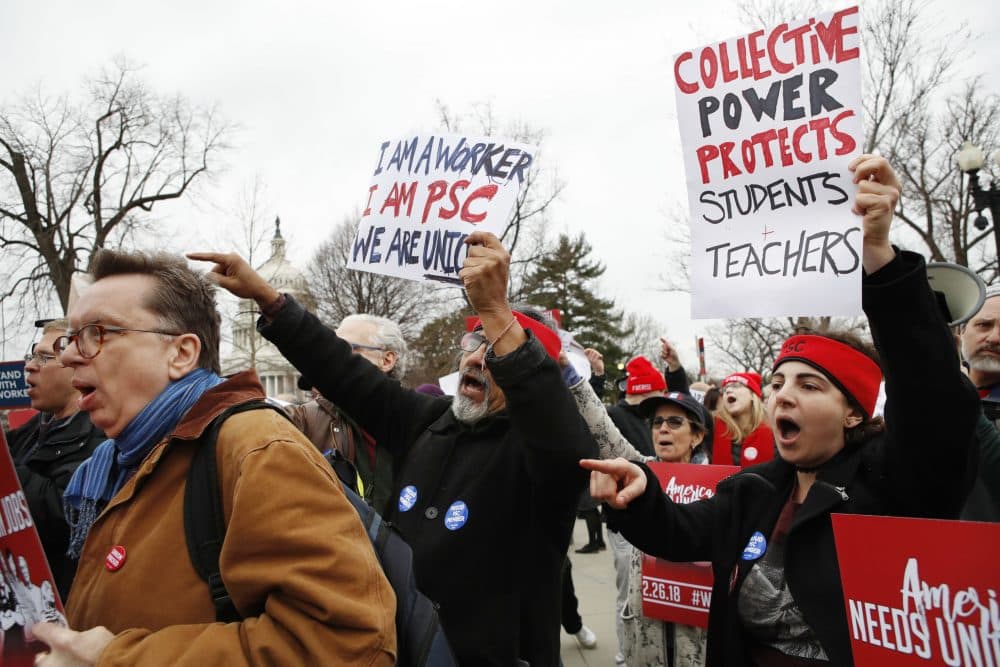Advertisement
Commentary
Paid Sick Leave? A Union Can Give You That

Having missed a couple of work days recently as a casualty of this nastier-than-normal flu season, I’ve been thinking that what we need, besides better vaccines, are unions.
I realize unions aren’t the first thing most people think of when wracked by coughs, congestion, fever and chills. The disconnect likely is because you have paid sick leave at your job. If you or your child gets the flu, you get time off to recover without having to worry about scrimping on groceries or the rent to cover the lost income.
But millions of your fellow Americans aren’t so lucky.
Fully two-thirds of low-wage workers get no paid sick leave—none. If they get sick or a child is ill and a parent needs to stay home, he or she is out of luck, period. The unlucky tend to be in lower-paying jobs requiring less education. As the Brookings Institution notes, in a brief comparing professions and their percentages of workers with sick leave:
“Food preparation (19 percent) and personal care and service (25 percent) workers are far less likely than those in, say, computer and mathematical occupations (88 percent), to have access to paid sick days.”
If you think this inequality is wrong (psst—you should), then there are two ways to fix the problem. Either the government mandates paid sick leave for all workers, or we encourage unionization so workers and employers can negotiate such benefits, privately in the marketplace. Pressure for the former will only build, and legitimately so, if we don't try the latter.
There are several things Congress and the president could do to encourage unionization. The short take is that they could look to Canada.
In Canada, it is easier to form a union, easier for the government to stop illegal, anti-union activity by employers and easier for an arbiter to impose a deal when unions and employees are deadlocked over their first collective bargaining.
Aligning our laws in these areas with Canada's would be easy, compared to reforming the zeitgeist of an era that's lost faith in institutions, organized labor included. Especially on the political right, unions carry a bullseye on their backs; just recently, in a case supported by conservative corporate and political interests, the Supreme Court heard arguments challenging public-sector unions’ right to dun non-members for collective bargaining expenses.
That legal assault, if successful, will reduce the funds available to unions for negotiating contracts and reinforce the slide in union potency that’s been underway for decades. That would put things like sick leave even further out of reach for workers. The court's decision, due before its term ends in June, has union supporters jittery, given the addition of Justice Neil Gorsuch to the conservative bloc.
Fully two-thirds of low-wage workers get no paid sick leave—none.
Anti-union forces, in the Supreme Court case as elsewhere, cloak their cause in pro-worker rhetoric. They claim that non-members who pay union fees are forced to subsidize the unions’ political lobbying, even if they don’t agree with the political point of view.
But non-members benefit from collective bargaining agreements negotiated by the unions and shouldn’t be allowed to mooch off organized labor’s efforts. There’s a reasonable compromise solution, as Justice Stephen Breyer pointed out: Make non-members pay for unions’ collective-bargaining expenses, defined specifically under state law, while disallowing dunning for non-bargaining expenses for which unions currently may charge.
Knee-jerks on the right should remember that their hero, the late Justice Antonin Scalia, supported just this compromise. “Where the state imposes upon the union a duty to deliver services, it may permit the union to demand reimbursement for them,” he wrote in a 1991 case.
Lord knows that public-sector unions aren’t always conducive to the public good. From defending incompetent teachers in New York City’s infamous “rubber rooms” to protecting bad-actor cops whose tactics have been a central complaint of the Black Lives Matter movement, union leaders too often have misread their duty of protecting members to include shielding people who ought to be fired.
But throwing out what’s actually helping to improve the quality of people’s lives makes no sense. And make no mistake, the decline of unions is one contributor to the inequality that President Trump’s supporters claim to care about. The successful, statewide strike by West Virginia teachers — which ended when the governor agreed to 5 percent pay raises — was a union campaign to redress grotesquely Dickensian remuneration for those in the classroom.
If you don’t believe me, asking your waiter or manicurist what would happen if they got the flu might convince you.
